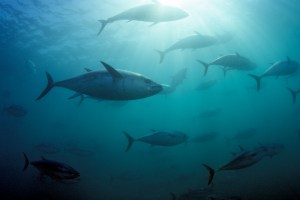
Corbis
The beleaguered bluefin was dealt another blow this week when the European Union, under pressure from France, Spain, Italy and Malta, all of which have a stake in the lucrative tuna fishery, backed down from lobbying for slashing quotas of the eastern Atlantic bluefin tuna at talks this week in Paris.
The EU fisheries commissioner Maria Damanaki had at one time advocated for more than halving the 2010 quota of 13,500 tons for 2011, a number that will be determined at the 10-day meeting now underway of the International Commission for the Conservation of Atlantic Tunas (ICCAT), the body charged with managing the stocks of the Atlantic bluefin.
Damanaki’s stance was welcomed by the conservation community, but on Wednesday night the EU bloc, which functions as one of ICCAT’s 48 members, announced it would instead seek for a compromise — better representing the interests of its powerful fishing nations — of either a continuation of the 2010 quota, or a small reduction in the neighborhood of 200o tons. (Watch a video about catching tuna in the Philippines.)
The EU’s decision was not good news for environmental groups who had been hoping, once again, that this year’s ICCAT meeting might deliver the kind of relief from the net that eastern Atlantic bluefin tuna populations need to recover. The number of breeding tuna in the eastern Atlantic has plunged over 74% since the late 1950s, with the steepest drop occurring in the past 10 years. At current fishing rates, the World Wildlife Fund (WWF) estimates that Atlantic bluefin that spawn in the Mediterranean could disappear from those waters as early as 2012.
“It was very disappointing,” says Dr. Susan Lieberman, director of international policy for Pew Environmental Group. “It shows a lack of willingness to recognize the reality of all of the fraud fraud in this fishery.”
ICCAT has been widely criticized for its weak management, particularly of the powerful purse seine fishery that catch schools of bluefin tuna and take them to be fattened in ranches in the Mediterranean. Most recently, just ahead of the ICCAT meeting,the International Consortium for Investigative Journalists (ICIJ) released a damning report of the Mediterranean tuna industry that estimates the black market for eastern bluefin during the peak years of 1998 to 2007 — which includes misdeeds up the supply chain including quota violation, underreporting of catches, use of banned equipment to find schools of fish, catching juvenile fish and government misreporting of catches — was worth about $4 billion. During that time, more than one in three eastern bluefin was caught illegally.
Lieberman says the 2010 quota, based on ICCAT scientists evaluation of available data that fishing between 0 and 13,5000 tons that year would give the fishery a 60% chance of recovery, is simply not good enough given all the illegal activity in the industry. “The scientists have said their data are inadequate and are not including all the fraud that’s going on,” she says. “We believe that in the absence of perfect data, you need to err on the side of precaution, which means a much lower quota.” Greenpeace, for its part, is calling for nothing short of a full closure of the Mediterranean fishery, citing ICCAT documents that as much as 10,200 tons of the 2009 catch may still be alive and being stored, unsold, in tuna farms in Croatia, Malta and Turkey.
Though the EU is only one country, and many others including the U.S. and the U.K. also have a say, Lieberman says she is not optimistic for a much better outcome for 2011 that what the EU has said it will back. “But we’re still going to be pushing for better than that,” she says. “It isn’t over ’til it’s over.”
Read more about the global tuna industry.


